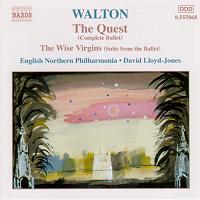
Deadly Sins
Walton's orchestral music -
enjoyed by ROBERT ANDERSON'The English Northern Philharmonia is on admirable form ...'
|

|
David Lloyd-Jones is much involved in the Walton Complete edition; here
he brings the notes alive with unfailing aplomb, admirable vitality and
skill. The Quest and The Wise Virgins (the Foolish Virgins
will get their turn in a moment) occupy a moral high ground appropriate
enough to a wartime Britain. Both ballets were conceived by Frederick Ashton
in the early 1940s. St George is the hero of The Quest, with Archimago
(Hypocrisy) as main opposition. The saint is in murderous mood, dispatching
three pernicious knights in the course of the work. The Seven Deadly Sins
have a rare time (and Walton with them) cavorting, which is not quite the
word for Sloth, in the Palace of Pride. At the end St George, in time-honoured
fashion, abandons the heroine, dons his armour, and pursues his quest, in
this case eminently patriotic.
The music was composed in haste and may not be major Walton; but there
is much to intrigue, and some moments of splendid inspiration. At the outset
St George is lost in a storm with Una, who personifies Truth [listen
-- track 1, 0:03-1:09]. The Archimago's first ploy is to transform his
servant into the semblance of Una in the hope of seducing the saint. There
is of course not a chance, but Walton tries his sensuous best [listen -- track 1, 5:28-6:25]. The greatest challenge to
the composer was to write a set of variations exemplifying each of the Deadly
Sins. Here his resource and wit are at full stretch; perhaps my favourite
is the torpid immobility of Sloth [listen -- track
4, 0:00-0:44]. Once the ballet runs out of adversaries, the saint bethinks
himself of England's plight and rides off in triumph to quell what foes
may still remain to her [listen -- track 7, 4:59-5:55].
Continue >>
Copyright © 24 November 2002
Robert Anderson, London, UK

|

